1061 scholarly books by Catholic University of America Press and 67
have author last names that start with C
1061 scholarly books by Catholic University of America Press and 67
1061 scholarly books by Catholic University of America Press
67 have author last names that start with C have author last names that start with C
67 have author last names that start with C have author last names that start with C
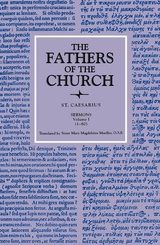
Sermons, Volume 1 (1–80)
Saint Caesarius of Arles
Catholic University of America Press, 1956
No description available
[more]
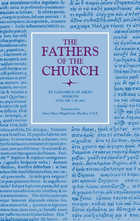
Sermons, Volume 2 (81–186)
Saint Caesarius of Arles
Catholic University of America Press, 1964
No description available
[more]
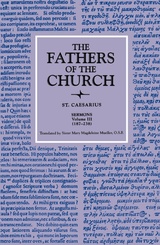
Sermons, Volume 3 (187–238)
Saint Caesarius of Arles
Catholic University of America Press, 1973
No description available
[more]
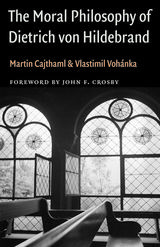
The Moral Philosophy of Dietrich von Hildebrand
Martin Cajthaml
Catholic University of America Press, 2020
The Moral Philosophy of Dietrich von Hildebrand is the first full-fledged monograph on von Hildebrand’s moral philosophy available to date. Despite this pioneering effort, its aim is not to treat all the themes belonging to this area with equal depth and breadth. Rather, it focuses on the themes indicated by the aforementioned questions and relates them according to their inner systematic links rather than according to how and when they appear in von Hildebrand’s works. It also engages von Hildebrand in a critical dialogue, particularly with the ethics of Plato and Aristotle. This book will serve as a very good introduction not just to von Hildebrand´s moral philosophy but to his thought in general.
[more]
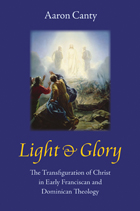
Light and Glory
The Transfiguration of Christ in Early Franciscan and Dominican Theology
Aaron Canty
Catholic University of America Press, 2011
Light and Glory offers an engaging comparison of the teachings of seven thirteenth-century theologians -- three Franciscans and four Dominicans -- on the subject of the transfiguration of Christ.
[more]
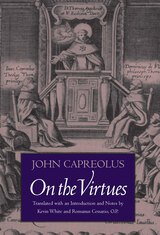
On the Virtues
Jean Capreolus
Catholic University of America Press, 2001
The selection from Capreolus's work represented in this translation shows him defending Aquinas's conclusions on faith, hope, charity, the gifts of the Holy Spirit, and the virtues against such adversaries.
[more]
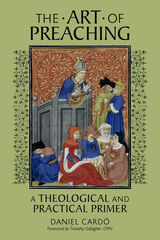
The Art of Preaching
A Theological and Practical Primer
Daniel Cardo
Catholic University of America Press, 2021
The growing awareness of the importance of preaching is a sign of our times. In the past decades, conscious that a renewal of preaching is essential for a renewed evangelization, many seminaries have implemented homiletic courses. However, there is still a real limitation of good and systematic resources in order to learn the theological depth and practical elements of the art of preaching.
The Art of Preaching: A Theological and Practical Primer aims to fill that gap. It explores the theological understanding of the homily, lessons from classical and contemporary rhetoric, the relevance of preaching for the life of the Church, highlighting recent teachings of the Magisterium, and it presents the incarnation as the foundation for preaching, understood as an essential aspect of the priestly life and mission.
This primer also offers a simple and effective method for the preparation and delivery of homilies, illustrating this by the example of brilliant preachers and exploring the idea of preaching as locus theologicus, i.e., the privileged place for the exercise of theology today. It is in deepening in the value and importance of preaching that theology can be renewed as a living and essential part of the daily life of priests. Seeing the homily not as a burden but as an occasion to fulfill the priestly identity will offer the opportunity to embrace the preparation for preaching as a key for unity among the many tasks and demands of pastoral life. In the homily prayer, study, and work come together.
The Art of Preaching will also provide a selection of homilies from the great preachers of the Church, organized chronologically, with brief introductions and commentaries that highlight what those homilies teach us for our preaching today. Only learning from the best preachers can we hope to preach effectively in our times.
[more]
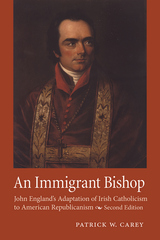
An Immigrant Bishop
John England's Adaptation of Irish Catholicism to American Republicanism, Second Edition
Patrick W. Carey
Catholic University of America Press, 2022
An Immigrant Bishop is a revised examination of the Irish intellectual roots of Bishop John England’s American pastoral works in the diocese of Charleston, South Carolina (1820-1842). The text focuses on his political philosophy and his theology of the Church, both of which were influenced by the Enlightenment and a theological, not a political, Gallicanism. As the study demonstrates, we now know more about England’s intellectual life prior to his immigration than we do about any other Catholic immigrant from Ireland. Neither Peter Guilday’s monumental two-volume biography (1927) of England nor any subsequent scholarly study of England has uncovered and analyzed, as this book does, England’s many unpublished and published writings in Ireland—his explicitly authored texts, his published speeches before the Cork Aggregate meetings, and his pseudonymous articles in the Cork Mercantile Chronicle between 1808, when he was ordained, and 1820, when he emigrated to the United States.
John England (1786-1842), the first Catholic bishop of Charleston, was the foremost national spokesman for Catholicism in the United States during the years of his episcopacy and the primary apologist for the compatibility of Catholicism and American republicanism. He was also the first Catholic bishop to speak before the United States Congress and the first American to receive a papal appointment as an Apostolic Delegate to a foreign country (in this case to negotiate a concordat with President Jean Pierre Boyer of Haiti). He is considered the father of the Baltimore Provincial Councils and the nineteenth-century American Catholic conciliar tradition. He was also the only bishop in American history to develop a constitutional form of diocesan government and administration. Among other things he was the first cleric to establish a diocesan newspaper that had something of a national distribution. England’s contribution to the early formation of an American Catholicism has been told many times before, but he has the kind of creative mind and episcopal leadership that demands repeated re-considerations.
[more]
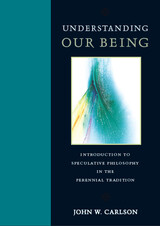
Understanding Our Being
Introduction to Speculative Philosophy in the Perennial Tradition
John W. Carlson
Catholic University of America Press, 2008
Written as an undergraduate textbook, Understanding Our Being treats central topics about our knowledge of being, the being of the natural world, and, via the latter, being as such
[more]
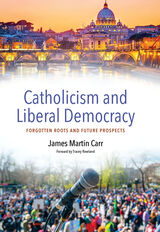
Catholicism and Liberal Democracy
Forgotten Roots and Future Prospects
James Martin Carr
Catholic University of America Press, 2022
Catholicism and Liberal Democracy seeks to clarify if there is a place for Catholicism in the public discourse of modern liberal democracy, bringing secular liberalism, as articulated by Jürgen Habermas, into conversation with the Catholic tradition.
James Martin Carr explores three aspects of the Catholic tradition relevant to this debate: the Church’s response to democracy from the nineteenth century up until the eve of the Second Vatican Council; the Council’s engagement with modernity, in particular through Gaudium et spes and Dignitatis humanae; and Joseph Ratzinger’s theology of politics as a particularly incisive (and influential) articulation of the Catholic tradition in this area.
Jürgen Habermas’s theorization of the place of religion in modern democracy, both in his earlier secularist phase and after his ‘post-secular’ turn, is evaluated. The adequacy of Habermas’s recent attempts to accommodate religious citizens are critically examined and it is argued that developments in his later thought logically require a more thoroughgoing revision of his earlier theory. These developments, it is argued, create tantalizing openings for fruitful dialogue between Habermas and the Catholic tradition.
Using analytical tools drawn from communications theory, the debates on same-sex marriage at Westminster and in the Irish referendum campaign are analyzed, assessing whether Catholic contributions to these debates comply with Habermasian rules of civic discourse. In light of this analysis, the prospects of, and impediments to, Catholic participation in public discourse are appraised.
Carr concludes by proposing a Ratzingerian critique of contemporary attempts to redefine marriage within a broader, more fundamental critique of the modern democratic state as currently configured. A political system founded upon secularist monism cannot but regard Christian Gelasianism, and its Catholic variant in particular, as an existential threat. Thus, Catholics, however Habermasian their political behavior, can never be more than uneasy bedfellows with modern liberal democracy.
[more]
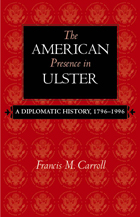
The American Presence in Ulster
A Diplomatic History, 1796–1996
Francis M. Carroll
Catholic University of America Press, 2005
Tells the story of the link between Ulster and the United States and presents the first general history of the U.S. Consulate in Belfast.
[more]
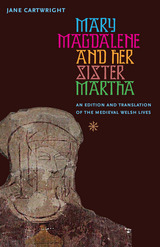
Mary Magdalene and Her Sister Martha
An Edition and Translation of the Medieval Welsh Lives
Jane Cartwright
Catholic University of America Press, 2013
Mary Magdalene and Her Sister Martha: An Edition and Translation of the Medieval Welsh Lives provides scholarly editions and English translations of the medieval Welsh versions of the legends of Mary Magdalene and Martha. Described by Victor Saxer as medieval best sellers, these hagiographical tales, which described how Mary Magdalene and her sister Martha survived a perilous sea voyage from the holy land and evangelized Provence, were available in many different Latin and vernacular versions and circulated widely in the medieval West. The texts were translated or adapted into Middle Welsh some time before the mid-fourteenth century: the Middle Welsh Life of Mary Magdalene is extant in thirteen manuscripts and the Middle Welsh Life of Martha is preserved in eight of the same manuscripts. Jane Cartwright makes the Middle Welsh versions available to an international audience for the first time and provides a detailed study of the Welsh manuscripts that contain the texts, a comparison between the different manuscripts versions and a discussion of the wider hagiographical context of the texts in Wales. The volume includes transcriptions, editions and translations of the two Lives based on the oldest most complete extant versions found in the Red Book of Talgarth c. 1400, as well as an additional section of text describing Mary Magdalenes life before Christs crucifixion from the fifteenth-century Aberystwyth, National Library of Wales, Peniarth MS 27ii. The edition is accompanied by a comprehensive glossary which provides translations of all medieval Welsh words that occur in the texts, an analysis of the development and transmission of the legends, as well as a discussion of the relevance and popularity of these two female saints in late medieval Wales: medieval Welsh poetry, church dedications, and holy wells are also considered.
[more]
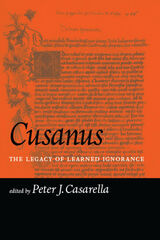
Cusanus
A Legacy of Learned Ignorance
Peter J. Casarella
Catholic University of America Press, 2006
This volume offers a detailed historical background to Cusanus's thinking while also assaying his significance for the present. It brings together major contributions from the English-speaking world as well as voices from Europe.
[more]
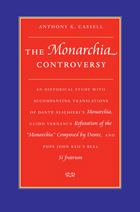
The Monarchia Controversy
An Historical Study with Accompanying Translations of Dante Alighieri's Monarchia, Guido Vernani's Refutation of the "Monarchia" Composed by Dante, and Pope John XXII's Bull Si fratrum
Anthony K. Cassell
Catholic University of America Press, 2004
The Monarchia Controversy provides both the background to the imperial and ecclesiastical machinations that drove Dante Alighieri to begin penning the Monarchia in 1318 and also the subsequent history of the efforts by papal authorities to ban the book after the writer's death
[more]
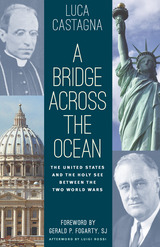
A Bridge Across the Ocean
Luca Castagna
Catholic University of America Press, 2014
A Bridge across the Ocean focuses on the relations between the United States and the Holy See from the First World War to the eve of the Second, through the combination of American, Italian, and Vatican sources. More than an overall picture of the American and Vatican foreign policy during the first half of the twentieth century, the book analyzes the U.S.-Vatican rapprochement in a multifaceted way, considering both the international and the internal sphere. A Bridge across the Ocean discusses the spread of anti-Catholicism in the United States during the first two decades of the twentieth century, and its repercussions on the American administrations' behavior during and after the Versailles Conference, together with the changes that occurred in the Holy See's attitude toward the American church and the White House after the election of Pope Pius XI. Luca Castagna explores the convergence of the New Deal legislation with the church's social thought, and demonstrates how the partial U.S.-Vatican rapprochement in 1939 resulted from Roosevelt and Pacelli's common aim to cooperate, as two of the most important and global moral powers in the struggle against Nazi-fascism.
[more]
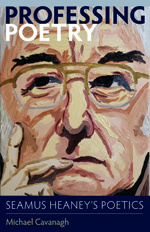
Professing Poetry
Seamus Heaney’s Poetics
Michael Cavanagh
Catholic University of America Press, 2009
The first full-length study of Heaney's poetics, Professing Poetry explores Heaney's unusual concept of influence and the various ways in which Heaney interacts with other writers
[more]
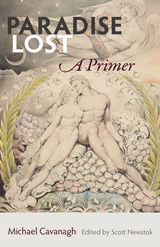
Paradise Lost
A Primer
Michael Cavanagh
Catholic University of America Press, 2020
A record of a teacher’s lifelong love affair with the beauty, wit, and profundity of Paradise Lost, celebrating John Milton’s un-doctrinal, complex, and therefore deeply satisfying perception of the human condition. After surveying Milton’s recurrent struggle as a reconciler of conflicting ideals, this Primer undertakes a book-by-book reading of Paradise Lost, reviewing key features of Milton’s “various style,” and why we treasure that style. Cavanagh constantly revisits Milton the singer and maker, and the artistic problems he faced in writing this almost impossible poem.
This book is emphatically for first-time readers of Milton, with little or no prior exposure, but with ambition to encounter challenging poetry. These are readers who tell you they “have always been meaning to read Paradise Lost,” who seek to enjoy the epic without being overwhelmed by its daunting learning and expansive frame of reference. Avoiding the narrowly specialized focus of most Milton scholarship, Cavanagh deals forthrightly with issues that recur across generations of readers, gathering selected voices—from scholars and poets alike—from 1674 through the present.
Lively and jargon-free, this Primer makes Paradise Lost accessible and fresh, offering a credible beginning to what is a great intellectual and aesthetic adventure.
[more]
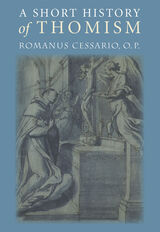
A Short History of Thomism
Romanus Cessario, O.P.
Catholic University of America Press, 2005
Using carefully selected resources, Romanus Cessario has composed a short account of the history of the Thomist tradition as it manifests itself through the more than seven hundred years that have elapsed since the death of Saint Thomas
[more]
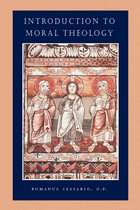
Introduction to Moral Theology (Catholic Moral Thought, Volume 1)
Romanus Cessario, O.P.
Catholic University of America Press, 2001
The present volume, the first in the new Catholic Moral Thought series, responds to the need for a new introduction to the basic and central elements of Catholic moral theology written in the light of Veritatis splendor.
[more]
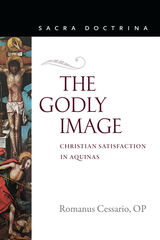
The Godly Image
Christian Satisfaction in Aquinas
Romanus Cessario
Catholic University of America Press, 2020
Christian satisfaction stands at the center of the Church’s teaching about salvation. Satisfaction pertains to studies about Christ, redemption, the Sacraments, and pastoral practice. The topic also enters into questions about God and the creature as well as about the divine mercy and providence. Somewhat neglected in the period after Vatican II, satisfaction now appears to scholars as the forgotten key to entering deeply into the mystery of Christ and his work. Seminarians especially will benefit from studying the place satisfaction holds in Catholic life.
Further, ecumenical work requires a proper understanding of the place that satisfaction holds in Christian theology. Various factors operative since the sixteenth century have worked to displace satisfaction almost entirely from reformed practice and theology. To address such concerns, The Godly Image, has, over the past several decades and more, done a great deal to put satisfaction within its proper context of image-restoration. That is, to interpret satisfaction within the context of the divine mercy and not the divine justice. This unique contribution to satisfaction studies owes a great deal to the achievement of Saint Thomas Aquinas. In this sense, the book enacts a retrieval of the theology of the high classical period. Like much of Aquinas’s refined teaching, a proper understanding requires appeal to the commentatorial tradition that follows him. Interested students will find in this study the touchstones for further studies of these authors.
The Godly Image aims also to distinguish the theology of Aquinas from that of the medieval author with whom the notion of satisfaction remains mostly identified, that is, Anselm of Canterbury. Although not a developed focus of the book’s contents, the attentive reader will recognize that Aquinas treats Saint Anselm with a reverential reading, even as the Common Doctor moves significantly away from interpretations of satisfaction that suggest that an angry God exacts from his innocent Son a painful substitutional penalty for a fallen human race.
[more]
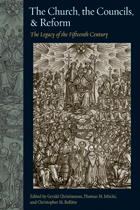
The Church, the Councils, and Reform
The Legacy of the Fifteenth Century
Gerald Christianson
Catholic University of America Press, 2008
The Church, the Councils, and Reform brings together leading authorities in the field of church history to reflect on the importance of the late medieval councils. This is the first book in English to consider the lasting significance of the period from Constance to Trent (1414-1563) when several councils met to heal the Great Schism (1378) and reform the church.
[more]
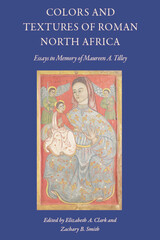
Colors and Textures of Roman North Africa
Essays in Memory of Maureen A. Tilley
Elizabeth A. Clark
Catholic University of America Press, 2023
This book serves two purposes: first, it celebrates the career of the late Maureen Tilley; second, it provides a “state of the field” look at some of the latest scholarship on Christian North Africa in late antiquity. The chapters, written by both senior scholars and the next generation of North African researchers, fills gaps in some of our understandings of the colorful people, places, and disputes that arose in the unique environment of Christian North Africa. The book centers around Augustine, Donatist studies, and North African biblical interpretation, representing Tilley’s major areas of interest, while also ensuring coverage of Tertullian (a major figure in the North African church and one of Tilley’s hobbyhorses) and the pilgrimages to North Africa and other places. It contributes to the field(s) by providing new scholarship from some of the biggest names in Christian North Africa studies (Patout Burns, Robin Jensen, Bill Tabbernee, Anthony Dupont, and Allan Fitzgerald) and in Patristic/early Christian studies writ large (Blake Leyerle and Geoffrey Dunn) while demonstrating the new trajectories of Christian North Africa research from early career (Alden Bass) and emerging (Colum Dever) scholars. The editors were Tilley’s dissertation director (the late Liz Clark) and one of her last mentees (Zach Smith), so the entire collection has a meta-view of academic genealogy – knowledge flowing from Tilley’s mentor, through colleagues and mentees, and down through and to the next generation who carry on those legacies.
[more]
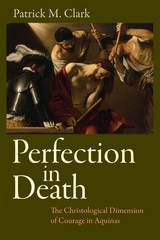
Perfection in Death
Patrick M. Clark
Catholic University of America Press, 2015
Perfection in Death compares and contrasts the relationship between conceptions of courage and death in the thought of Aquinas and his ancient philosophical sources. At the center of this investigation is Aquinas' identification of martyrdom as the paradigmatic act of courage as well as "the greatest proof of the perfection of charity." Such a portrayal of "perfection in death" bears some resemblance to the ancient tradition of "noble death", but departs from it in decisive ways. Clark argues that this departure can only be fully understood in light of an accompanying transformation of the metaphysical and anthropological framework underlying ancient theories of virtue. Perfection in Death aims to provide a new, theological account of this paradigm shift in light of contemporary Thomistic scholarship.
[more]
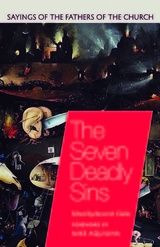
The Seven Deadly Sins
Sayings of the Fathers of the Church
Kevin M. Clarke
Catholic University of America Press, 2018
The Seven Deadly Sins: Sayings of the Fathers of the Church is the inaugural volume in a new series from the Catholic University of America Press. This series will feature a wide range of scholars compiling material from the Fathers of the Church series to focus on a specific area of theology. Forthcoming titles will focus on Death, Judgement, Heaven and Hell, and Angels and Demons, with others to be announced shortly.
Sacred Scripture did not neatly list the seven deadly sins, so where did this tradition come from? Unsurprisingly, it can be traced back to the Church Fathers. But were there eight or seven? In a sense, the answer is “both.” The tradition of the capital sins has a rich development in the patristic era, not only in the presentation of the list of vices but in the preaching and teaching of the early shepherds of the Church. So how do the capital sins spawn other vices in the soul? How does one cultivate the virtues that heal the soul from those vices? How are gluttony and lust related? Is sadness really a vice? How is vainglory different from pride? What role does almsgiving have in soothing the passion of anger? The Fathers of the Church answer these questions and more in this volume.
The capital vices are the gateway drugs to countless sins. The path of the book descends through the vices, culminating with their queen ruler, pride. The words of the Fathers will assist the reader in being more realistic about the attacks upon the soul. The text should also be edifying and medicinal. Since each chapter begins with vice and ends with virtue, one’s path through the chapters represents a sort of ascent out of vice and into the freedom of the virtues. The text gives special attention throughout to the thought of Augustine of Hippo, Evagrius of Pontus, John Cassian, Gregory the Great, and Maximus the Confessor.
Sacred Scripture did not neatly list the seven deadly sins, so where did this tradition come from? Unsurprisingly, it can be traced back to the Church Fathers. But were there eight or seven? In a sense, the answer is “both.” The tradition of the capital sins has a rich development in the patristic era, not only in the presentation of the list of vices but in the preaching and teaching of the early shepherds of the Church. So how do the capital sins spawn other vices in the soul? How does one cultivate the virtues that heal the soul from those vices? How are gluttony and lust related? Is sadness really a vice? How is vainglory different from pride? What role does almsgiving have in soothing the passion of anger? The Fathers of the Church answer these questions and more in this volume.
The capital vices are the gateway drugs to countless sins. The path of the book descends through the vices, culminating with their queen ruler, pride. The words of the Fathers will assist the reader in being more realistic about the attacks upon the soul. The text should also be edifying and medicinal. Since each chapter begins with vice and ends with virtue, one’s path through the chapters represents a sort of ascent out of vice and into the freedom of the virtues. The text gives special attention throughout to the thought of Augustine of Hippo, Evagrius of Pontus, John Cassian, Gregory the Great, and Maximus the Confessor.
[more]
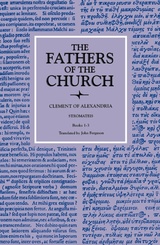
Stromateis, Books 1–3
Clement of Alexandria
Catholic University of America Press, 1991
Books One to Three of the Stromateis establish Clement's fundamental theology--a harmony of faith and knowledge that places Greek philosophy at the service of faith, which is, to Clement, more important than knowledge.
[more]
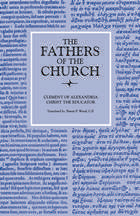
Christ the Educator
Clement of Alexandria
Catholic University of America Press, 1954
No description available
[more]
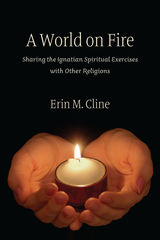
A World On Fire
Sharing the Ignatian Spiritual Exercises with Other Religions
Erin M. Cline
Catholic University of America Press, 2018
The Spiritual Exercises of St. Ignatius of Loyola give shape to the spiritual lives of Jesuits and many other Christians. But might these different ways of praying, meditating, and reading scripture be helpful to members of other faiths as well? In response to the call of Fr. Adolfo Nicolas, SJ, the thirtieth Superior General of the Jesuits (2008-2016) to explore how the Ignatian Spiritual Exercises can be fruitfully appropriated by non-Christians, A World on Fire analyzes the prospects for adapting the Spiritual Exercises in order to make them accessible to members of other faith traditions while still maintaining their core meaning and integrity.
Erin Cline examines why this ought to be done, for whom, and what the aims of such an adaptation would be, including the different theological justifications for this practice. She concludes that there are compelling reasons for sharing the Exercises with members of other religions and that doing so coheres with the central mission of the Jesuits. A World on Fire goes on to examine the question of how the Exercises can be faithfully adapted for members of other religions. In outlining adaptations for the Hindu, Buddhist, and Confucian traditions that draw upon the traditional content of the Exercises supplemented by the texts of these religious traditions, Cline shows how Ignatian spirituality can help point the way to a different kind of inter-religious dialogue – one that is not bound up in technical terminology or confined to conversations between theologians and religious leaders. Rather, in making the Spriitual Exercises accessible to members of other faith traditions, we are as Pope Francis puts it, “living on a frontier, one in which the Gospel meets the needs of the people to whom it should be proclaimed in an understandable and meaningful way.”
A World on Fire will be of interest to comparative theologians and scholars working on inter-religious dialogue, religious pluralism, contemplative studies, and spirituality, as well as Jesuit priests and other practitioners who employ the Spiritual Exercises in their ministry.
Erin Cline examines why this ought to be done, for whom, and what the aims of such an adaptation would be, including the different theological justifications for this practice. She concludes that there are compelling reasons for sharing the Exercises with members of other religions and that doing so coheres with the central mission of the Jesuits. A World on Fire goes on to examine the question of how the Exercises can be faithfully adapted for members of other religions. In outlining adaptations for the Hindu, Buddhist, and Confucian traditions that draw upon the traditional content of the Exercises supplemented by the texts of these religious traditions, Cline shows how Ignatian spirituality can help point the way to a different kind of inter-religious dialogue – one that is not bound up in technical terminology or confined to conversations between theologians and religious leaders. Rather, in making the Spriitual Exercises accessible to members of other faith traditions, we are as Pope Francis puts it, “living on a frontier, one in which the Gospel meets the needs of the people to whom it should be proclaimed in an understandable and meaningful way.”
A World on Fire will be of interest to comparative theologians and scholars working on inter-religious dialogue, religious pluralism, contemplative studies, and spirituality, as well as Jesuit priests and other practitioners who employ the Spiritual Exercises in their ministry.
[more]
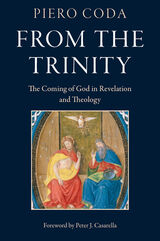
From the Trinity
The Coming of God in Revelation and Theology
Piero Coda
Catholic University of America Press, 2020
From the Trinity provides an overall view of the history and the philosophical and theological significance of God the Trinity, not only from a religious point of view but from an anthropological and socio-cultural view as well. The perspective is that of Christian doctrine, specifically Catholic, in dialogue with the cultural sensitivity of our times and with the religious pluralism that characterizes it.
Following the generative-progressive method proposed by Vatican II, the book begins with a phenomenological reading of the signs of the times, with special focus upon the performative aspect of the announcement and the doctrine of faith. In particular, constant attention to the contribution made by the mystics and great charisms (from Augustine of Hippo to Francis of Assisi and Theresa of Avila up until Therese of Lisieux, Edith Stein and Chaira Lubich) toward a deeper understanding of the Trinitarian truth.
From the Trinity is unique in what it offers not only for Trinitarian theology, but also for other theological disciplines (Christology, Pneumatology, Anthropology, Ecclesiology, etc.) – in which the Trinity shines forth as the central and enlightening truth – as well as for philosophy, the humanities and the natural sciences. This perspective is especially developed in terms of a Trinitarian ontology (see Part V) by which reality is understood in light of the revelation of the Trinity. The implications of the incarnation of the Son of God and the gift of the Holy Spirit are taken seriously in studying the truth of all things as they are perceived in the space created by living and thinking “in” Jesus, united to the Father in the Spirit, as suggested by the title of the book, looking upon reality “From the Trinity.”
[more]
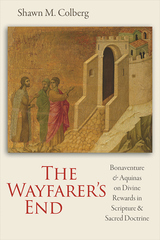
The Wayfarer's End
Bonaventure and Aquinas on Divine Rewards in Scripture and Sacred Doctrine
Shawn M. Colberg
Catholic University of America Press, 2020
The Wayfarer’s End follows the human person’s journey to union with God in the theologies of Saint Bonaventure and Saint Thomas Aquinas. It argues that these seminal thinkers of the 13th Century emphasize scriptural notions of divine rewards as ordering principles for the graced movement of human viators to eternal life. Divine rewards emerge as a fundamental category through the study’s emphasis on Thomas and Bonaventure as scriptural commentators and preachers whose work in sacra pagina structures the content of their sacra doctrina. Shawn Colberg places Bonaventure’s and Aquinas’s scriptural, dogmatic, and polemical works into conversation and illumines their mutually edifying depictions of the way to eternal life.
Looking to the journey itself, The Wayfarer’s End demonstrates a nuanced understanding of the roles played by God and human beings in the movement to full beatitude. To that end, it explores the relationships between grace and human nature, the effects of sin on the human person, the vital themes of predestination, conversion, perseverance, and the place of “reward-worthy” human action within the overall movement toward union with God. While St. Bonaventure and St. Thomas both stress the priority of grace and divine action for the journey, the study also illustrates their distinct frameworks for human action, unpacking Bonaventure’s preference for the language of acceptatio versus Thomas’s emphasis on ordinatio. This difference inflects their language of rewards, their exposition of scripture, and the scope of free human action in the movement to union with God.
This study places the two most seminal theologians of the 13th Century into conversation on central and enduring topics of Christian life. Such a comparative study has been sorely lacking in the field of studies on Aquinas and Bonaventure. It offers insight to those interested in high scholastic thought, Franciscan and Dominican understandings of human salvation, and Thomist and Franciscan theology as it pertains to questions of the Reformation, including biblical exegesis on justification and sanctification. Above all, the study appreciates and foregrounds the richness of Bonaventure’s and Aquinas’s vocations: mendicant theologians concerned to share the fruits of contemplation with fellow friars and others seeking the goal of the wayfarer’s end.
[more]
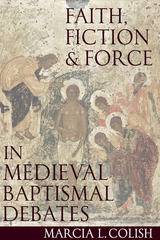
Faith, Force and Fiction in Medieval Baptismal Debates
Marcia L. Colish
Catholic University of America Press, 2014
Drawing on a wide and interdisciplinary range of sources that goes well beyond the writings of theologians and canonists to include liturgical texts and practices, the rulings of popes and church councils, saints' lives, chronicles, imaginative literature, and poetry, Faith, Fiction and Force in Medieval Baptismal Debates illuminates the emergence and fortunes of these three controversies and the historical contexts that situate their development. Each debate has its own story line, its own turning points, and its own seminal figures whose positions informed its course. The thinkers involved in each case were, and regarded one another as being, members of the orthodox western Christian communion. Thus, another finding of this book is that Christian orthodoxy in the Middle Ages was able to encompass and accept disagreements both wide and deep on a sacrament seen as fundamental to Christian identity, faith and practice.
[more]
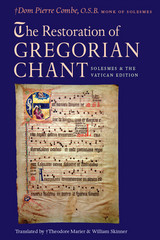
The Restoration of Gregorian Chant
Solesmes and the Vatican Edition
Dom Pierre Combe, O.S.B.
Catholic University of America Press, 2003
This book presents for the first time in English the fully documented history of the Gregorian chant restoration which culminated in the publication of the Vatican Edition ordered by Pope Pius X at the dawn of the twentieth century. It is based upon archival documents in the Abbey of St. Pierre de Solesmes.
[more]

Peter Comestor's Lectures on the Glossed Gospel of John
A Study with a Critical Edition and Translation
Peter Comestor
Catholic University of America Press, 2023
This monograph encompasses the first critical edition, translation, and historical study of a series of lectures from the cathedral school of Notre-Dame, Peter Comestor’s Glosses on the Glossed Gospel of John. Delivered in Paris in the mid-1150s, Comestor’s expansive lecture course on the Glossa ordinaria on the Gospel of John has survived in no fewer than seventeen manuscript witnesses, being preserved in the form of continuous transcripts taken in shorthand by a student-reporter (reportationes). The editor has selected the fifteen best witnesses to produce a critical edition and translation of the first chapter of Comestor’s lectures on the Gospel of John. In addition to the text of the original lectures, the edition includes appendices containing accretions to the lecture materials added by Comestor and his students, as well as the corresponding text of the Glossa ordinaria from which Comestor lectured.
The Latin text and translation of Peter Comestor’s lectures are preceded by a wide-ranging critical study of the historical and intellectual context of Peter Comestor’s biblical teaching. This study begins with an outline of Comestor’s scholastic career and known works, with a detailed introduction to his Gospel lectures and the relevant historiography. Subsequently, a survey is made of the intellectual landscape of Comestor’s lectures: namely, the tradition of biblical teaching originating at the School of Laon, preserved in the Glossa ordinaria, and developed in the classroom by Peter Lombard and a succession of Parisian masters, notably Comestor himself. The following section examines the portion of the lectures presented in this book, encompassing an overview of its contents and structure, a description of Comestor’s teaching method and scholastic setting, a study of the text’s sources, and a consideration of Comestor’s participation and reception in the scholastic tradition. The final chapters contain a careful description of the manuscripts and editorial principles adopted in the Latin edition and translation.
[more]
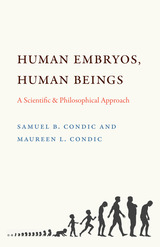
Human Embryos, Human Beings
A Scientific and Philosophical Approach
Samuel B. Condic
Catholic University of America Press, 2018
The overall purpose of Human Embryos, Human Beings is to establish the ontological status of the human embryo, in light of the most recent biological evidence. The thesis of the book is that sound philosophical reasoning and the available scientific evidence support the claim that a human being is present from the moment of fertilization onward (the “immediate hominization” view) and does not support the contrary claim that a human being appears only after a time following fertilization (the “delayed hominization” view). Included in the scope of this argument is an examination of several long-standing philosophical arguments claiming that immediate hominization is false; a detailed examination of several arguments claiming that though immediate hominization is possible, both evidence and argument best support the delayed hominization view or some alternate view; and an examination of several cases where natural defect or scientific manipulation make determining the ontological status of the embryo more difficult. The book also includes a presentation of hylomorphism, as this is the philosophical viewpoint employed by the authors to analyze the question. Human Embryos, Human Beings is based on the premise that philosophical and scientific approaches are not in conflict, with the most comprehensive understanding of human embryos being achieved by application of a rigorous hylomorphic philosophy to the best available scientific data. Often, one finds either a thorough and well-reasoned philosophical account or a detailed scientific account. This book makes a welcome addition to the field by integrating both of these needed elements into a single text.
[more]
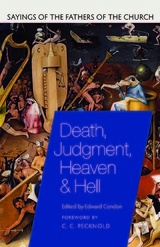
Death, Judgement, Heaven, and Hell
Edward Condon
Catholic University of America Press, 2019
In this volume, canon lawyer and writer Edward Condon compiles a book full of wisdom and compelling insights. More than anything, the Fathers warn us that our life is short, and the reckoning for how we have lived it eternal. The urgency of the Church’s message, brought to life in the sayings of the Fathers, comes to remind us of our true calling and inheritance in baptism, and of the richness of the heavenly reward, which is not so much the fruit of our efforts on Earth but the fulfillment of God’s promise of love to us. The terror of hell is not the threat of the dictator, but a dire warning of the true scope of our freedom as children of God.
[more]
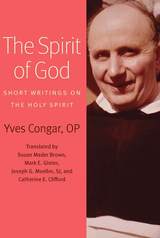
The Spirit of God
Short Writings on the Holy Spirit
Yves Congar
Catholic University of America Press, 2017
Yves Congar was the most significant voice in Catholic pneumatology in the twentieth century. This new collection of short pieces makes his thought accessible to a broad range of readers – scholars, teachers, ecumenists and laity – and thus helps to ensure that an important theological voice, one that influenced many of the documents of the Second Vatican Council, continues to be heard.
The Spirit of God brings together for the first time eight of Yves Congar’s previously untranslated writings on the Holy Spirit composed after Vatican II (from 1969 to 1985). Two of these selections offer general overviews of Congar’s pneumatology, a pneumatology based upon Scripture and the Tradition of the Church, but articulated in conversation with philosophers, ecumenical partners and non-believers. Other articles make clear the historical context of Vatican II’s pneumatology and the Holy Spirit’s crucial influence upon the unfolding of history and upon the moral life, the efficacy of the sacraments and, especially, upon ecclesial life.
The writings in The Spirit of God have been translated and edited by a team of scholars familiar with the work of the French Dominican theologian. An introduction situates each of the writings historically and highlights its theological significance. A bibliography lists Congar’s publications on the Holy Spirit, the major articles and books written about his pneumatology, and the major scholarly resources to which Congar made reference in the notes that accompanied these writings. An index of biblical references and of personal names is also included.
The Spirit of God brings together for the first time eight of Yves Congar’s previously untranslated writings on the Holy Spirit composed after Vatican II (from 1969 to 1985). Two of these selections offer general overviews of Congar’s pneumatology, a pneumatology based upon Scripture and the Tradition of the Church, but articulated in conversation with philosophers, ecumenical partners and non-believers. Other articles make clear the historical context of Vatican II’s pneumatology and the Holy Spirit’s crucial influence upon the unfolding of history and upon the moral life, the efficacy of the sacraments and, especially, upon ecclesial life.
The writings in The Spirit of God have been translated and edited by a team of scholars familiar with the work of the French Dominican theologian. An introduction situates each of the writings historically and highlights its theological significance. A bibliography lists Congar’s publications on the Holy Spirit, the major articles and books written about his pneumatology, and the major scholarly resources to which Congar made reference in the notes that accompanied these writings. An index of biblical references and of personal names is also included.
[more]
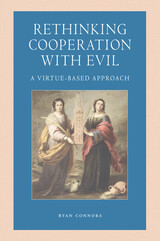
Rethinking Cooperation with Evil
A Virtue-Based Approach
Ryan Connors
Catholic University of America Press, 2023
Rethinking Cooperation with Evil: A Virtue-Based Approach applies Thomistic virtue theory to today’s most challenging questions of cooperation with evil.
For centuries, moralists have struggled to determine the conditions necessary to justify moral cooperation with evil. The English Jesuit Henry Davis even observed: “[T]here is no more difficult question than this in the whole range of Moral Theology.” This important book addresses this challenge by applying the virtue-based method of moral reasoning of St. Thomas Aquinas to issues of cooperation with evil.
Those who pastor souls report frequently receiving questions from attentive believers about whether a particular human action inadvertently contributes to some moral evil. Examples of potentially immoral cooperation with evil include whether one may shop at a particular franchise known for its support of abortion, whether Catholics may attend civil marriages outside the Church, or whether an organization may submit to government mandates that health insurance include payment for immoral practices.
Although recent moralists have tackled specific topics related to cooperation with evil, agreement on an overall common paradigm has not yet been reached. Rethinking Cooperation with Evil proposes a method for Christian believers and others to approach these questions from the foundation of the thought of St. Thomas Aquinas and the magisterial teaching of the Catholic Church. This text provides both an overall method for how to understand the issue of cooperation, as well as practical counsel for specific cases.
Rethinking Cooperation with Evil advances the theological conversation on this topic from both speculative and practical vantage points. To facilitate his argument, Connors utilizes historical analyses that contrast Aquinas’s method of moral reasoning with that of the casuist treatment of cooperation. Consequently, the book includes numerous case studies that will be of interest both to moral theologians and readers new to the topic.
[more]

Guiding to a Blessed End
Andrew of Caesarea and His Apocalypse Commentary in the Ancient Church
Eugenia Scarvelis Constantinou
Catholic University of America Press, 2013
In this interesting and insightful work, Eugenia Scarvelis Constantinou, the leading expert on Andrew of Caesarea and the first to translate his Apocalypse commentary into any modern language, identifies an exact date for the commentary and a probable recipient. Her groundbreaking book, the first ever written about Andrew, analyzes his historical milieu, education, style, methodology, theology, eschatology, and pervasive and lasting influence. She explains the direct correlation between Andrew of Caesarea and fluctuating status of the Book of Revelation in Eastern Christianity through the centuries.
[more]
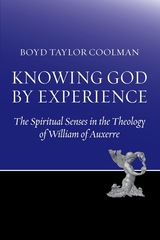
Knowing God by Experience
The Spiritual Senses in the Theology of William of Auxerre
Boyd Taylor Coolman
Catholic University of America Press, 2004
This book, the first English-language monograph on William of Auxerre, traces the motif of the spiritual senses through his Summa Aurea, using it as an illuminating and unifying lens through which to appreciate his theology
[more]
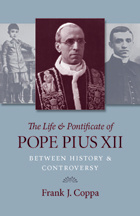
The Life and Pontificate of Pope Pius Xii
Frank Coppa
Catholic University of America Press, 2013
Written by one of the foremost historians of Pius XII, the present biographical study, unlike the greater part of the vast and growing historiography of Pope Pius XII, is a balanced and nonreactive account of his life and times. Its focus is not on the popes silence during the Holocaust, though it does address the issue in a historical and objective framework. This is a biography of the man as well as the pope. It probes the roots of his traditionalism and legalism, his approach to modernity and reformism in Church and society, and the influences behind his policies and actions.
[more]
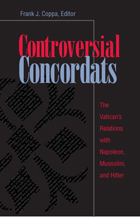
Controversial Concordats
The Vatican's Relations with Napoleon, Mussolini, and Hitler
Frank J. Coppa
Catholic University of America Press, 1999
Controversial Concordats offers an engaging survey of the relationship of the Roman Catholic Church with three dictatorial figures in the nineteenth and twentieth centuries: Napoleon, Mussolini, and Hitler.
[more]
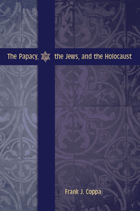
The Papacy, the Jews, and the Holocaust
Frank J. Coppa
Catholic University of America Press, 2006
This work not only examines Rome's reaction during the fascist period but delves into the broader historical development and the impact of theological anti-Judaism
[more]
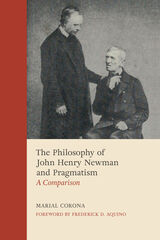
The Philosophy of John Henry Newman and Pragmatism
A Comparison
Marial Corona
Catholic University of America Press, 2023
In recent years, interest in John Henry Newman as a philosopher has gained momentum. This work places his philosophical insights in conversation with philosophers from the pragmatic tradition, particularly with C. S. Peirce, the classical pragmatists, and those who have followed their line, and shows several lines of concurrence. It argues that Newman overcame the modern philosophy of his time by reconnecting to the Aristotelian tradition in a very similar way to how Peirce did it fifty years later and the new pragmatists a century after.
Without claiming that Newman is a pragmatist philosopher, pragmatism is used as a foil, or point of access, to delve into Newman’s philosophy and bring forth the richness of his thought while placing him in the canon of philosophy. This approach deepens the understanding of his philosophical contributions and widens their reach to circles that have previously not engaged with him. Further, this study provides a means to understand pragmatism’s resources from a seldom-used vantage point and perhaps appreciate its fruitfulness in a new way.
Much emphasis is placed in Newman’s texts that refer to his search for and commitment to the truth. The particular nuances of his thought that are brought to light showcase the effective intellectual resources that his writings contain. Newman does not provide ready-made answers to today’s questions, but the way he analyzes and engages with the quandaries of his time can point us to creative and fruitful ways of engaging with those of our times.
[more]

Summa metaphysicae ad mentem Sancti Thomae
Essays in Honor of John F. Wippel
Therese Scarpelli Cory
Catholic University of America Press, 2023
This volume is a tribute to Fr. John F. Wippel. Following the philosophical order that Aquinas might have adopted “had he chosen to write a Summa metaphysicae”—an order that Wippel himself lays out in his Metaphysical Thought of Thomas Aquinas—these essays unfold new research on some of the most intriguing topics in Aquinas’s metaphysics, from the most recent generation of scholars formed by Wippel’s pioneering work.
The contributors address the discovery of being qua being via separation (Gregory T. Doolan), propter quid metaphysical demonstrations (Philip Neri Reese), the origins of the controversies about the real distinction between essence and esse (Mark Gossiaux), a defense of essence-realism as a key to the real distinction (David Twetten), the relationship of likeness and agency (Therese Scarpelli Cory), created form as act and potency (Stephen Brock), the variation of accidental forms (Gloria Frost), the possibility of angelic judgment (Francis Feingold), argumentation for the existence of God (Gaven Kerr), the propriety of “Qui Est” as a Divine Name (Brian Carl), ‘Beauty’ as a Divine Name (Michael Rubin), and God’s application of creaturely powers to action (Jason Mitchell).
[more]
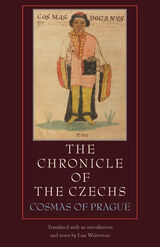
The Chronicle of the Czechs
Lisa Cosmas of Prague
Catholic University of America Press, 2009
The Chronicle of the Czechs by Cosmas of Prague (d. 1125) is a masterwork of medieval historical writing, deeply erudite, consciously researched, and narrated in high rhetorical style.
[more]
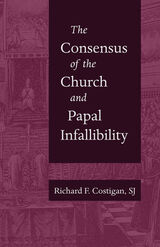
The Consensus of the Church and Papal Infallibility
A Study in the Background of Vatican I
Richard F. Costigan, S.J.
Catholic University of America Press, 2005
After a concise introduction that defines the two schools of theology, Richard Costigan examines the thought of nine major theologians on the subject: Bossuet, Tournely, Orsi, Ballerini, Bailly, Bergier, La Luzerne, Muzzarelli, and Perrone.
[more]
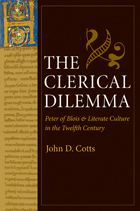
The Clerical Dilemma
Peter of Blois and Literate Culture in the Twelfth Century
John D. Cotts
Catholic University of America Press, 2009
The Clerical Dilemma is the first book-length study of Peter of Blois's life, thought, and writings in any language
[more]
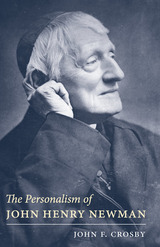
The Personalism of John Henry Newman
John Crosby
Catholic University of America Press, 2014
In The Personalism of John Henry Newman, Crosby shows the reader how Newman finds the life-giving religious knowledge that he seeks. He explores the "heart" in Newman and explains what Newman was saying when he chose as his cardinal's motto, cor ad cor loquitur (heart speaks to heart). He explains what Newman means in saying that religious truth is transmitted not by argument but by "personal influence."
[more]
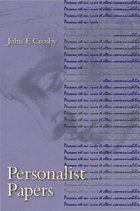
Personalist Papers
John F. Crosby
Catholic University of America Press, 2004
In Personalist Papers, John F. Crosby continues the discussion of Christian personalism begun in his highly acclaimed book, The Selfhood of the Human Person.
[more]
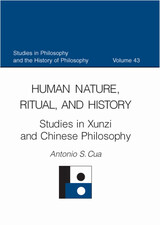
Human Nature, Ritual, and History
Studies in Xunzi and Chinese Philosophy (Studies in Philosophy and the History of Philosophy, Volume 43)
Antonio S. Cua
Catholic University of America Press, 2005
In this volume, distinguished philosopher Antonio S. Cua offers a collection of original studies on Xunzi, a leading classical Confucian thinker, and on other aspects of Chinese philosophy.
[more]
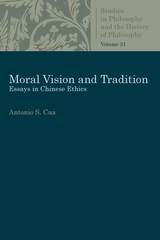
Moral Vision and Tradition
Antonio S. Cua
Catholic University of America Press, 2018
This volume offers a comprehensive philosophical study of Confucian ethics-its basic insights and its relevance to contemporary Western moral philosophy. Distinguished writer and philosopher A. S. Cua presents fourteen essays which deal with various probl
[more]
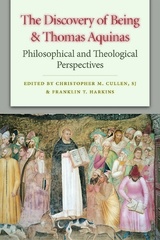
The Discovery of Being and Thomas Aquinas
Christopher M. Cullen, SJ
Catholic University of America Press, 2019
While there has been agreement among followers of Aquinas that being insofar as it is being (being qua being) is the subject of metaphysics, there is not agreement on how this being qua being is to be understood, nor on how we come to know the being that is the object of metaphysical investigation. The topic of what being is, as the object of the science of metaphysics, and how to account for the “discovery” of the being of metaphysics have emerged as central problems for the contemporary retrieval of Aquinas and for the larger project of post-Leonine Thomism in general. This lack of agreement has hampered the retrieval of Aquinas’s metaphysics.
The collection of essays within The Discovery of Being and Thomas Aquinas is divided into three major parts: the first set of essays concerns the foundation of metaphysics within Thomism; the second set exemplifies the use of metaphysics in fundamental philosophical issues within Thomism; and the third set employs metaphysics in central theological issues.
The Discovery of Being and Thomas Aquinas allows major scholars of the different types of Thomism to engage in a full-scale defense of their position, as well as expanding Thomistic metaphysics to the discipline of theology in important ways.
The collection of essays within The Discovery of Being and Thomas Aquinas is divided into three major parts: the first set of essays concerns the foundation of metaphysics within Thomism; the second set exemplifies the use of metaphysics in fundamental philosophical issues within Thomism; and the third set employs metaphysics in central theological issues.
The Discovery of Being and Thomas Aquinas allows major scholars of the different types of Thomism to engage in a full-scale defense of their position, as well as expanding Thomistic metaphysics to the discipline of theology in important ways.
[more]
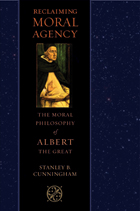
Reclaiming Moral Agency
The Moral Philosophy of Albert the Great
Stanley B. Cunningham
Catholic University of America Press, 2008
This book provides a comprehensive analysis of the moral philosophy Albert the Great (1200-1280)--the first and only such undertaking in English
[more]
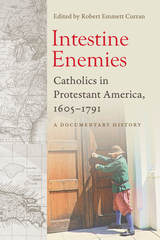
Intestine Enemies
Robert Emmett Curran
Catholic University of America Press, 2017
Intestine Enemies: Catholics in Protestant America, 1605-1791is a documentary survey of the experience of Roman Catholics in the British Atlantic world from Maryland to Barbados and Nova Scotia to Jamaica over the course of the two centuries that spanned colonization to independence. It covers the first faltering efforts of the British Catholic community to establish colonies in the late sixteenth and early seventeenth centuries; to their presence in the proprietary and royal colonies of the seventeenth century where policies of formal or practical toleration allowed Catholics some freedom for civic or religious participation; to their marginalization throughout the British Empire by the political revolution of 1688; to their transformation from aliens to citizens through their disproportionate contribution to the wars in the latter half of that century as a consequence of which half of the colonies of Britain’s American Empire gained their independence.The volume organizes representative documents from a wide array of public and private records – broadsides, newspapers, and legislative acts to correspondence, diaries, and reports – into topical chapters bridged by contextualized introductions. It affords students and readers in general the opportunity to have first-hand access to history. It serves also as a complement to Papist Devils: Catholics in British America, 1574-1783, a narrative history of the same topic.
[more]
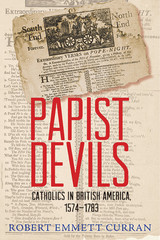
Papist Devils
Robert Emmett Curran
Catholic University of America Press, 2014
This is a brief highly readable history of the Catholic experience in British America, which shaped the development of the colonies and the nascent republic in the seventeenth and eighteenth centuries. Historian Robert Emmett Curran begins his account with the English reformation, which helps us to understand the Catholic exodus from England, Ireland, and Scotland that took place over the nearly two centuries that constitute the colonial period. The deeply rooted English understanding of Catholics as enemies of the political and religious values at the heart of British tradition, ironically acted as a catalyst for the emergence of a Catholic republican movement that was a critical factor in the decision of a strong majority of American Catholics in 1775 to support the cause for independence
[more]
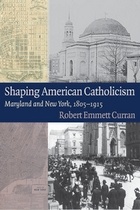
Shaping American Catholicism
Maryland and New York, 1805-1915
Robert Emmett Curran
Catholic University of America Press, 2012
Distinguished historian Robert Emmett Curran presents an informed and balanced study of the American Catholic Church's experience in its two most important regions in the nineteenth and twentieth centuries
[more]
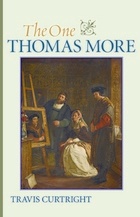
The One Thomas More
Travis Curtright
Catholic University of America Press, 2012
The One Thomas More carefully studies the central humanist and polemical texts written by More to illustrate a coherent development of thought.
[more]
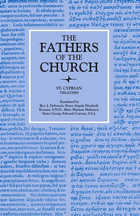
Treatises
Saint Cyprian
Catholic University of America Press, 1958
This volume presents several treatises of St. Cyprian (200/10?-258) in translation.
[more]
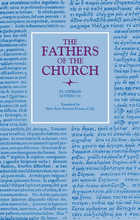
Letters (1–81)
Saint Cyprian
Catholic University of America Press, 1964
The letters, of which eighty-one have come down to us, written from c.249 until his death in 258 A.D., may be found translated in this volume.
[more]
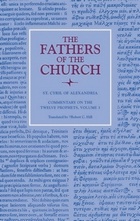
Commentary on the Twelve Prophets, Volume 3
Cyril of Alexandria
Catholic University of America Press, 2012
No description available
[more]
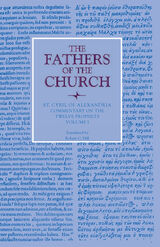
Commentary on the Twelve Prophets, Volume 1
Saint Cyril of Alexandria
Catholic University of America Press, 2007
No description available
[more]
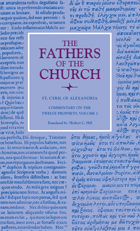
Commentary on the Twelve Prophets, Volume 2
Saint Cyril of Alexandria
Catholic University of America Press, 2007
No description available
[more]
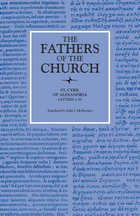
Letters 1–50
Saint Cyril of Alexandria
Catholic University of America Press, 1987
No description available
[more]
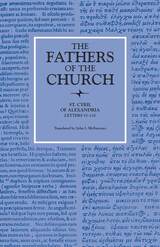
Letters 51–110
Saint Cyril of Alexandria
Catholic University of America Press, 1987
No description available
[more]
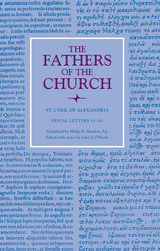
Festal Letters 13-30
St. Cyril of Alexandria
Catholic University of America Press, 2013
Twenty-nine in all, these letters cover all but three of Cyril's years as a bishop. The first twelve were published in 2009 (Fathers of the Church 118). The present volume completes the set. Festal letters were used in Alexandria primarily to announce the beginning of Lent and the date of Easter. They also served a catechetical purpose, however, allowing the Patriarch an annual opportunity to write pastorally not just about issues facing the entire see, but also about the theological issues of the day.
[more]
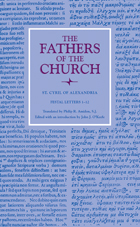
Festal Letters 1-12
St. Cyril of Alexandria
Catholic University of America Press, 2013
No description available
[more]
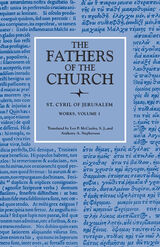
The Works of Saint Cyril of Jerusalem, Volume 1
Saint Cyril of Jerusalem
Catholic University of America Press, 1969
No description available
[more]
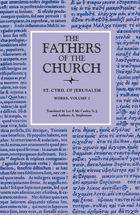
The Works of Saint Cyril of Jerusalem, Volume 2
Saint Cyril of Jerusalem
Catholic University of America Press, 1970
No description available
[more]
READERS
Browse our collection.
PUBLISHERS
See BiblioVault's publisher services.
STUDENT SERVICES
Files for college accessibility offices.
UChicago Accessibility Resources
home | accessibility | search | about | contact us
BiblioVault ® 2001 - 2024
The University of Chicago Press









